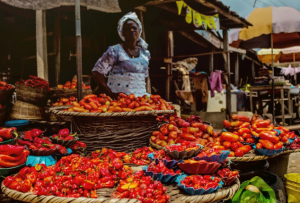
Food prices in Nigeria have risen by 40.53%, the highest in nearly 30 years. This has made life harder for ordinary citizens who already spend a large part of their income on food. With prices increasing every month, many Nigerians now see food as a luxury.
Nigeria, Africa’s most populous country, has long faced food insecurity, poverty, and widespread violence. Conflicts have disrupted farming and displaced farmers, making food production and distribution difficult. Kidnappings in Northern Nigeria have also worsened the situation. The United Nations estimates over 26 million Nigerians are at risk of food insecurity this year.
Desperation is growing. In February, at least seven people died in a stampede at the Lagos customs office, where confiscated rice was being sold at discounted prices. There have also been attacks on warehouses across the country.
“People are hungry and angry. A meal of bread and beans that used to cost ₦500 now costs at least ₦700 or ₦1000,” says Aminat Balogun, a fashion designer in Ogun State.
Driven by rising food prices, Nigeria’s overall inflation reached 33.69% in April, despite the central bank raising interest rates in February and March. The Central Bank of Nigeria (CBN) is expected to raise rates again at its next meeting on May 20. CBN Governor Olayemi Cardoso told the Financial Times that the bank will “do whatever is necessary” to tackle inflation. However, Lagos-based consulting firm SBM Intelligence noted that the structural issues driving inflation in Nigeria limit the effectiveness of these measures.
“The cost of living crisis will kill us all if care is not taken,” said Abibat Olayemi, who runs a grocery store in Lagos. Her sales have dropped by 50% as customers spend less due to rising prices.
Sosanwo, who runs a block business, says relief is urgently needed. “I don’t even know how an ordinary man is surviving. Right now, rice is ₦75,000 to ₦76,000 per bag. Imagine asking an ordinary man when he last cooked rice in his house,” he told TechCabal.
Experts have long argued that Nigeria should focus on achieving food security rather than self-sufficiency. The government has banned certain food imports and closed borders to boost local production and exports, but this has only increased food insecurity. Nigeria does not produce enough food to feed its population, and many people lack access to nutritious food.
“Temporarily suspending import restrictions on key food items can help stabilize prices and ensure access to affordable food,” said Basil Abia, co-founder of Veriv Africa, a data insights company. “Encouraging state governments to invest in agriculture through revenue-sharing programs can also enhance food security.”
Since taking office in May 2023, President Tinubu has introduced several economic reforms, including removing $10 billion-a-year fuel subsidies and adopting a uniform exchange rate. While these moves have been praised by international investors, they have triggered a cost of living crisis for ordinary Nigerians. The International Monetary Fund (IMF) projects that Nigeria will lose its place as Africa’s third-largest economy to Algeria in 2024.
Tinubu declared a state of emergency last July to tackle rising food prices and shortages and opened up food reserves. He insists that Nigeria is on course to achieve food security. “Nigeria will be self-sufficient in food production during my administration,” he said last week. But poor Nigerians need more than assurances.
